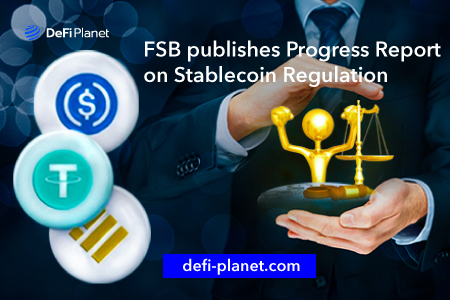Last updated on November 17th, 2022 at 12:36 pm
On 7 October 2021, the G20-mandated regulatory standard-setter, the Financial Stability Board (FSB) published a document titled: “Regulation, Supervision, and Oversight of “Global Stablecoin” Arrangements – Progress Report on the implementation of the FSB High-Level Recommendations” (Progress Report). The Progress Report was in respect of the relates to the High-Level Recommendations that the FSB published earlier, in 2020. The box below sets out the FSB’s 2020 High-Level Recommendations.
| Box 1.1 FSB High-Level recommendations to address the regulatory, supervisory, and oversight challenges raised by GSCs arrangements
|
The FSB’s 2021 Progress Report
The Progress Report provides a status update on the regulatory implementation of the FSB’s 2020 High-Level Recommendations. It also discusses the key market and regulatory developments since FSB’s 2020 High-Level Recommendations and identifies potential areas for future international regulatory development.
The recommendations were addressed to public sector regulatory authorities, rather than the private sector actors in the stablecoin area or the wider cryptocurrency space. However, the private sector should pay particular attention as these recommendations will likely drive the nature and timing of regulatory developments for stablecoins in individual jurisdictions.
Below is a summary of the FSB’s Progress Report.
FSB assumes increased volumes will equate to financial stability risks
The FSB notes that “the current generation so-called stablecoins are not being used for mainstream payments on a significant scale” but cautioned that greater “participation by retail investors could give rise to broader financial stability issues through an erosion of trust in the financial system”.
Basically, regulators will enforce strict regulation on stablecoins with international reach (which the FSB terms ‘Global Stablecoins’ or GSC) in the event that retail volumes increase dramatically.
Regulatory Implementation of the FSB’s High-Level Recommendations is still at an early stage
Earlier in 2021, the FSB conducted a stocktake of the implementation of its High-Level Recommendations, involving 48 jurisdictions across the world. According to the FSB, “several jurisdictions have been reviewing and updating their legal and regulatory regimes to address specific risks arising from the emergence of stablecoins”.
Divergence in jurisdictional approaches to stablecoins
The FSB reports that whilst certain jurisdictions are seeking to implement its recommendations through the creation of new regimes specifically for stablecoins or cryptocurrencies in general, others are simply trying to retrofit existing rules to make them applicable to stablecoins.
| BOX 2.1 The example of the European Union For example, in the European Union (EU), the European Commission issued in 2020 a proposal for a Regulation* on Markets in Cryptoassets (MiCA). According to the FSB, MiCA sets out a comprehensive regulatory framework for all crypto-assets and aims to
Note that MiCA is still a draft and is not yet law as there is an extensive legislative process to go through. *A “Regulation” is a powerful type of EU law that is directly binding on all EU member states without the need for national implementation unlike a “Directive” which requires national implementation. |
In its Progress Report, the FSB also flags the risk that different regulatory classifications and approaches to stablecoins in different jurisdictions may lead to “regulatory arbitrage and harmful market fragmentation”.
Same economic activities, same regulation
The FSB is of the view that where stablecoins perform the same economic function as existing regulated activities, regulatory authorities should rely on existing standards and principles that are designed for those regulated activities. Any remaining gaps in existing regulatory regimes should then be addressed “holistically and in a manner that is coordinated across sectors”.
This is unsurprising as we often hear regulators talk about ‘same risk, same regulation’ or ‘same activity, same regulation’. The extent to which this approach is appropriate or sensible in the context of major technological developments which fundamentally change the nature of an activity is open to debate.
Areas for future international regulatory work
The FSB has identified, from its stocktake in the first half of 2021, areas for further regulatory work at the international level. These are:
- Conditions for qualifying a stablecoin as a Global Stablecoins (GSC i.e. stablecoins with international reach);
- Prudential, investor protection, and other requirements for issuers, custodians, and providers of other GSC functions (e.g., wallet providers);
- Redemption rights;
- Cross-border and cross-sectoral cooperation and coordination; and
- Mutual recognition and deference.
The FSB sees further work on the above as helping to support the effective implementation of its High-Level Recommendations. This, in turn, will mitigate the risks that it says GSCs would pose to financial stability.
In Conclusion…
- Although the FSB’s 2020 High-Level Recommendations were addressed to public sector regulatory authorities, the private sector should pay particular attention as these recommendations will likely drive the nature and timing of regulatory developments for stablecoins in individual jurisdictions.
- We believe that stablecoins are likely to be one of the first areas of the crypto-economy sector in which policymakers will impose detailed regulatory and supervisory requirements. This may be due, in part, to the intrinsic relationship between stablecoins and fiat currencies, as stablecoins are typically backed either by holdings of a single fiat currency or a basket of such currencies and/or other assets denominated in fiat currencies.
- As countries and regulatory bodies grapple with the public policy implications of the nascent crypto sector, there is a need for international coordination of regulatory approaches; otherwise, the risk of regulatory fragmentation, regulatory arbitrage, and knee-jerk policymaking is high. Nonetheless, the message to the crypto sector is clear: regulation is coming soon!





















